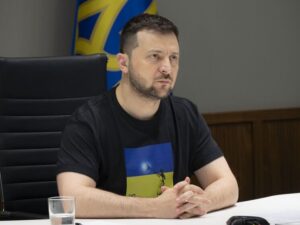
President of Ukraine Volodymyr Zelensky believes that keeping Ukraine outside the EU, European unification works against Europe.
“The final stage of a large diplomatic marathon has begun, which should end in a week and a half. And we are in this marathon together with the European Union, on the same team,” he said in a traditional video message on Saturday evening.
According to Zelensky, “we will soon receive an answer about the status of a candidate for EU membership.”
“I am convinced that this decision can strengthen not only our state, but the entire European Union. What else needs to happen in Europe to make it clear to skeptics that the very fact of keeping Ukraine outside the EU, European unification works against Europe?” he.
For example, the president noted, “everything is obvious to the Russian occupiers, they say so when they mock our people, this is supposedly because Ukraine went to Europe. Where are the skeptics in Europe then?”

President of Ukraine Volodymyr Zelensky said that the European Union’s response to Ukraine’s application for membership will show whether Europe has a future.
“Now, of course, is a decisive time. Not only for Ukraine, but also for the European Union, for the entire European continent. Now it is being decided what the future of a united Europe will be like and whether it will be at all. Russia wants to destroy European unity, wants to leave Europe split and weak. All of Europe is a target for Russia, and Ukraine is only the first stage in this aggression, in these plans,” Zelensky said at a briefing with European Commission President Ursula von der Leyen in Kyiv on Saturday.
That is why, according to the head of state, “a positive response of the European Union to the Ukrainian application for EU membership can become a positive answer to the question – does the European project have a future at all.”
Zelensky stressed that the people of Ukraine have already made a great contribution to the protection of freedom and values shared with the European Union.
“Thousands of Ukrainian lives were given to live in Ukraine and all of Europe as a person, to live freely. During such a brutal war, Ukrainians made sure that state and public institutions remain stable. Our people are absolutely integrated into the European space,” he said.
He also noted that polls conducted among the European population showed that people support Ukraine in joining the EU.
“And this is fair. And we are really looking forward to the recognition of this reality at the political level on June 23-24, when the historic meeting of the European Council for us should take place. Its logical decision should be to grant Ukraine the status of an EU candidate country. We really believe in this … The Ukrainian people will do everything necessary for the European integration of Ukraine,” Zelensky stressed, adding that “the European project definitely cannot be completed without Ukraine.”
EU, EUROPE, FUTURE, MEMBERSHIP, ZELENSKY
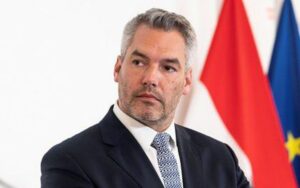
Austrian Chancellor Karl Nehammer announced the need to create a “European preparatory space” (Europäischen Vorbereitungsraum), staying in which will allow Ukraine and Moldova to come closer to EU standards.
According to him, it should be “an intermediate step between cooperation and full accession to the EU.”
“We are united by one goal, we all want a strong, independent and economically successful Ukraine. Currently, Ukraine is fighting for its political and territorial survival. All our efforts are primarily aimed at ending Russia’s aggressive war. At such a stage, rapid full accession to the European Union cannot be a topical issue anyway,” Nehammer said in an interview with Kronen Zeitung.
According to him, it is necessary to “remove emotions from the current debate and apply the same standards that are also used in relation to other applicants from the Western Balkans.”
“In my opinion, the immediate full accession of Ukraine is unrealistic,” the Chancellor said.
Nehammer said he supported French President Emmanuel Macron’s interesting idea of creating a “European Political Community”. “Discussions are largely about either – or. Little attention has been paid to practical options that ensure close ties with the EU in many areas and strengthen the Ukrainian economy. But this is exactly what is needed now,” the Chancellor said.
According to the newspaper, according to the Federal Chancellery, close and gradual cooperation between the EU and Ukraine is possible in various fields, similar to what is envisaged by the French proposals. Austrian Foreign Minister Alexander Schallenberg and European Minister Caroline Edtstadler have already addressed the EU partners with these proposals.
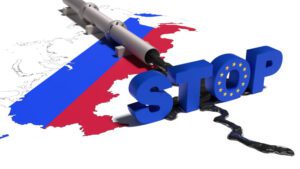
The seventh package of EU sanctions will include Russian gas and an expanded list of banks, head of the Office of the President of Ukraine Andriy Yermak said.
“The seventh package of sanctions against Russia is our priority. The EU has already begun work on it. New restrictions should apply to Russian gas and expand the list of banks that will be disconnected from SWIFT, in particular, Gazprombank,” he wrote on his Telegram channel. on Saturday evening with reference to the Deputy Foreign Minister of Poland, Pavel Yablonsky.
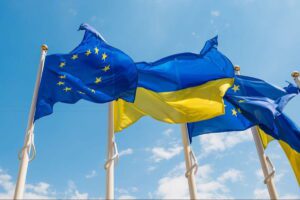
Regulation of the European Parliament and Council No. 2022/870 on temporary trade liberalization measures, exempting Ukrainian exports from duties for a year, came into force on Saturday, the Ministry of Economy reported.
“This decision complements the opportunities that our exporters have in accordance with the Association Agreement between Ukraine and the EU. Now the tariffs prescribed in the Agreement will be temporarily suspended,” the agency said.
It clarified that these were duties for industrial products; suspension of the application of the entry price system for fruits and vegetables and all tariff quotas for agricultural products; and the suspension of anti-dumping duties on imports of goods originating from Ukraine and the application of global safeguard measures in relation to Ukrainian goods.
In turn, the liberalization of trade relations implies that Ukraine will comply with European rules: the origin of goods and related procedures under the Association Agreement; refraining from any new restrictions on imports from the EU; Ukraine’s respect for democratic principles, human rights and fundamental freedoms, the rule of law, and the fight against corruption.
“These new rules will be in effect for a year and will help Ukrainian producers and exporters withstand the pressure of the war and strengthen their positions in the European market,” the Ministry of Economy stressed.
It indicated that the EU is now Ukraine’s largest trading partner. In 2021, the European Union accounted for 39% of the total trade volume of our state. The volume of trade increased by 35% and amounted to $62.5 billion.
Ukraine exports to the European Union, primarily ferrous metals, ores, electrical machines, oil and grain. “We expect that trade liberalization will help our exporters strengthen their positions in these and other commodity niches,” the Ministry of Economy added.
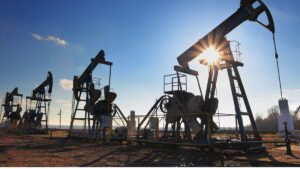
The sixth package of EU sanctions provides for a phase-out of Russian oil, in particular from 6 months for crude oil to 8 months for other refined products, the European Council reported.
“The EU has decided to ban the purchase, import or transfer of crude oil and certain petroleum products from Russia to the EU. The phase-out of Russian oil will take from 6 months for crude oil to 8 months for other refined products,” the European Council said in a press release on its website. on Friday.
A temporary exemption is provided for the import of crude oil by pipeline to those EU member states that, due to their geographical position, suffer from a special dependence on supplies from Russia and do not have viable alternatives.
“Moreover, Bulgaria and Croatia will also receive temporary derogations regarding the import of Russian marine oil and vacuum diesel fuel, respectively,” the European Council said.